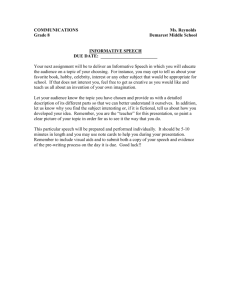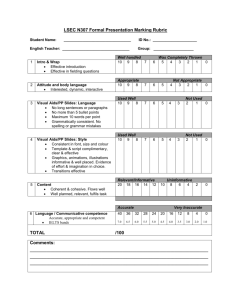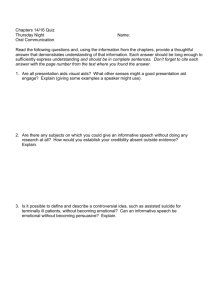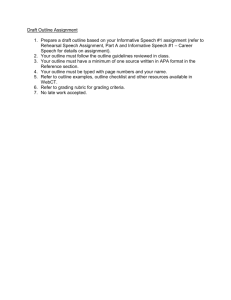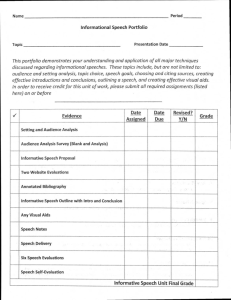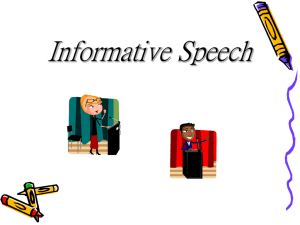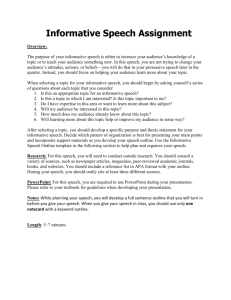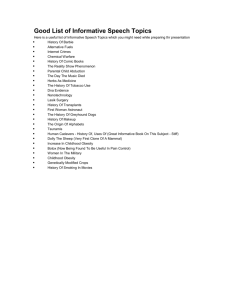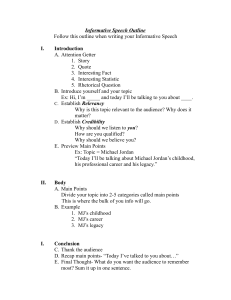Informative Speech Guidelines and Criteria
advertisement
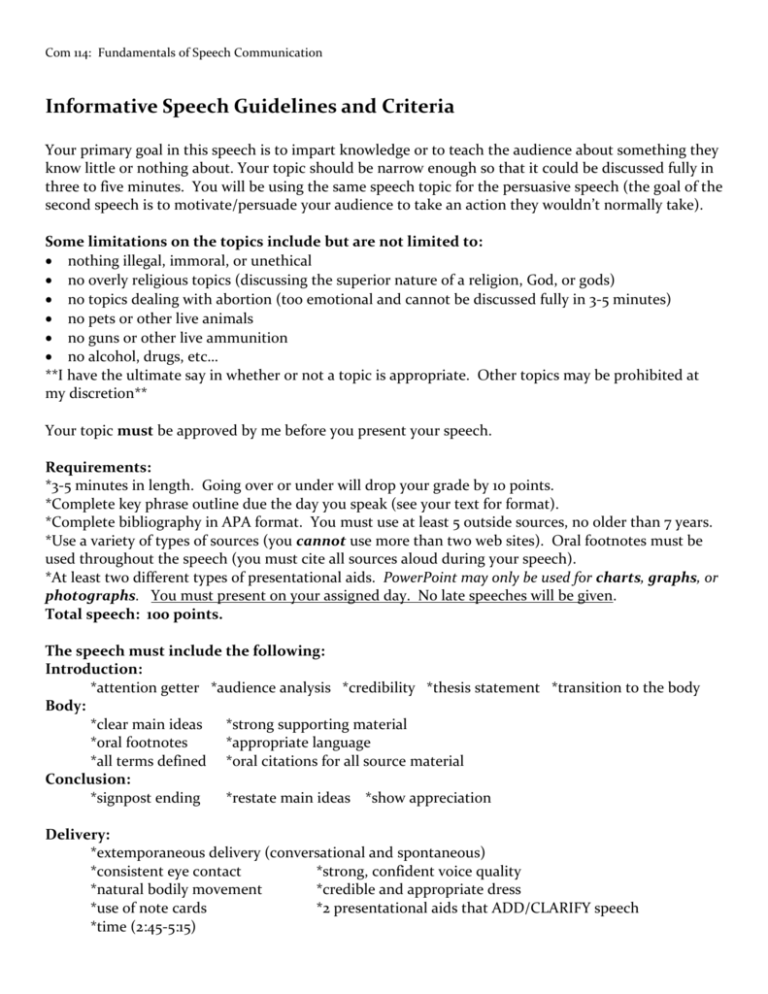
Com 114: Fundamentals of Speech Communication Informative Speech Guidelines and Criteria Your primary goal in this speech is to impart knowledge or to teach the audience about something they know little or nothing about. Your topic should be narrow enough so that it could be discussed fully in three to five minutes. You will be using the same speech topic for the persuasive speech (the goal of the second speech is to motivate/persuade your audience to take an action they wouldn’t normally take). Some limitations on the topics include but are not limited to: nothing illegal, immoral, or unethical no overly religious topics (discussing the superior nature of a religion, God, or gods) no topics dealing with abortion (too emotional and cannot be discussed fully in 3-5 minutes) no pets or other live animals no guns or other live ammunition no alcohol, drugs, etc… **I have the ultimate say in whether or not a topic is appropriate. Other topics may be prohibited at my discretion** Your topic must be approved by me before you present your speech. Requirements: *3-5 minutes in length. Going over or under will drop your grade by 10 points. *Complete key phrase outline due the day you speak (see your text for format). *Complete bibliography in APA format. You must use at least 5 outside sources, no older than 7 years. *Use a variety of types of sources (you cannot use more than two web sites). Oral footnotes must be used throughout the speech (you must cite all sources aloud during your speech). *At least two different types of presentational aids. PowerPoint may only be used for charts, graphs, or photographs. You must present on your assigned day. No late speeches will be given. Total speech: 100 points. The speech must include the following: Introduction: *attention getter *audience analysis *credibility *thesis statement *transition to the body Body: *clear main ideas *strong supporting material *oral footnotes *appropriate language *all terms defined *oral citations for all source material Conclusion: *signpost ending *restate main ideas *show appreciation Delivery: *extemporaneous delivery (conversational and spontaneous) *consistent eye contact *strong, confident voice quality *natural bodily movement *credible and appropriate dress *use of note cards *2 presentational aids that ADD/CLARIFY speech *time (2:45-5:15) Informative Speech Topic (Due Wed 10-27-10) Name: * Your topic must be approved by me before you may begin researching Informative Speech The purpose of this speech is to inform the audience about something that is important and relevant, both to you & your audience. Basic requirements include: 3-5 minute speaking time, 5 sources, and 2 visual aids. A keyphrase outline of your speech along with an APA style reference page of your sources must be turned in before your speech. Think of a topic you would like to speak about, fill in the information below, and get it approved by me by the due date! Speech Topic: Call to action: Attention getter: Thesis Statement: Informative Speech Ideas #1: The Place Speech. Most people like to travel and will enjoy hearing an informative speech about a place they've never been. Give a speech about your summer trip to Iceland, or talk about a nearby tourist destination that your fellow students might enjoy. A speech about your hometown might be interesting as well. When you give a place speech, be sure to discuss activities and details you think your fellow students will enjoy. They might not care about the great new senior center in your hometown, but they might be interested in the night life and hiking trails. #2: The College Speech. Your fellow students and you all have one thing in common: you are students at the same school! Therefore, if you give a speech about your school, you won't have to work hard to make the speech relevant to everybody. Research something interesting that most people don't know about your school. Talk about some famous alumni or some interesting historical trivia. #3: The Current Event Speech. Students often wish they had more time to keep up with current events, so many will find this kind of speech useful. Discuss the historical background of a conflict. Explain a new government policy. Introduce students to a political candidate. Remember; keep your opinions out, because this is not a persuasive speech. #4: The Local Current Event Speech. Inform your fellow students about what's going on in your community or what's going on around campus. If there's a local election, provide some information about the candidates. If there's some local legislation that affects students, your speech on the issue will be very relevant. #5: The Celebrity Speech. Who doesn't secretly love to dish about celebrities? Give an informative speech about a celebrity you find particularly interesting. Just be sure to provide some information everyone doesn't already know. #6: The Band Speech. Talk about the history of a popular band or about some of your local bands. Or discuss a new musical trend. Be sure to play some music as part of your speech. #7: The Career Speech. This may not sound so exciting but nonetheless, students are genuinely concerned about their futures, and a speech about a career they might consider can be very useful. #8: The Medical Condition Speech. No, don't give a graphic speech about those huge warts on the bottom of your feet. But if you have a medical condition and feel comfortable sharing this with the class, this can be a great speech topic. I've had students give speeches about their diabetes, food allergies, and macular degeneration (a form of emerging blindness), and students were fascinated to hear these personal accounts. You might also talk about a loved one's medical struggles. #9: The Food Speech. An especially good idea if your speech class is right before lunch! Talk about a type of cuisine, or about ways to make healthy food. #10: The Sports Speech. Discuss the history of a local team or a popular sport. Just remember: not everyone is as knowledgeable about sports as you might be, so be sure to explain unfamiliar terms so you don't lose part of your audience.
